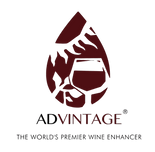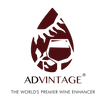From Skeptic to Believer: A Bordeaux Winemaker's Journey with ADVINTAGE®
A family trip to New York changed my views on winemaking technology. As a third-generation winemaker in Bordeaux, I've always believed that great wine comes from tradition, terroir, and time—lots of time. Our family has been making wine the same way for over a century, and like many of my colleagues in Bordeaux, I was naturally **skeptical of anything that promised to "enhance" wine** through modern technology.
But sometimes, life has a way of challenging your preconceptions. During my family holiday in Manhattan, I was introduced to ADVINTAGE® by a wine bar owner who insisted I try it. My first instinct was polite resistance, but curiosity got the better of me, and I agreed to a demonstration.
The Moment of Transformation in New York

The demonstration was simple yet profound. We started with a young wine—not unlike many of the wines we produce in our early stages. The wine was good, but it had that harsh edge that young wines often possess, the kind of astringency that reminds you why patience is a virtue in our industry.
Then came the **ADVINTAGE®**. Just one drop into the glass. Within moments, the transformation was undeniable. The wine that had been sharp and somewhat closed immediately opened up. The harsh edges softened, the tannins became more integrated, and the overall mouthfeel became **rounder and more approachable**. It was as if the wine had aged years in a matter of seconds. I realized I might be witnessing the next evolution in wine enhancement technology.
The Rigorous Bordeaux Blind Test

The experience in New York stayed with me. I knew that for this technology to gain acceptance, it would need to pass the most rigorous test possible: a blind evaluation by the discerning palates of my peers in Bordeaux. I assembled a panel of five true wine experts, including two fellow winemakers, a respected wine merchant, an industry professional, and a passionate, unbiased wine lover.
For our test, I selected a very young white wine—the kind that typically requires significant time to develop its full character. We used the **ADVINTAGE® White** blend to target the wine's acidity and complexity. Each taster evaluated the wine in its natural state, then tasted the same wine enhanced with the enhancer, without knowing which was which.
Unanimous Expert Confirmation
The results were remarkably consistent. Four of the five experts felt the difference immediately. The moment the enhanced wine touched their palates, they recognized something special was happening. The wine was described as **"opened up," "rounder,"** and **"easier to drink straight away."**
The fifth expert, initially skeptical, began to notice the same improvements approximately ten minutes after the **ADVINTAGE®** was added. This suggested that the enhancement continues to work and integrate with the wine even after the initial application. By the end, all five experts had reached the same conclusion: **ADVINTAGE® had demonstrably improved the wine.**
Implications for the Future of Winemaking

This technology isn't about replacing tradition; it's about giving us another tool to help our wines reach their full potential. What impressed me most about **ADVINTAGE®** was that it didn't mask or artificially alter the wine's character. Instead, it seemed to unlock qualities that were already present but not yet fully expressed. This is crucial for us in Bordeaux, where **terroir and authenticity are paramount**.
For producers, this innovation offers unprecedented flexibility. Wines that might normally require extensive aging before they're ready for market can be brought to optimal drinking condition more quickly, improving cash flow and reducing carrying costs. It can also help us address vintage variations and achieve the consistency that consumers expect.
Specifically, my mind went immediately to our younger, tannic **Bordeaux red wines**. If **ADVINTAGE®** could smooth the acidity and open up a young white, I realized the immense potential for instantly softening the powerful, sometimes abrasive tannins in our Cabernet Sauvignon or Merlot blends. This is the missing link for delivering approachability and a velvety texture without sacrificing the wine's core structure and waiting years.
The technology offers specific benefits depending on the wine type. For tackling the harsh tannins of young red blends, ADVINTAGE® Red is the ideal solution. For delicate Rosés and lighter-bodied wines, the precision of ADVINTAGE® Light ensures perfect refinement. To explore all three targeted formulas, you can view the full selection here: ADVINTAGE® Wine Enhancer Collection.
As I reflect on my journey from skeptic to believer, I'm excited about the possibilities that **ADVINTAGE®** represents for our industry. It's an enhancement that can help all of these elements work more effectively together, allowing us to share the magic of great wine with an even broader audience.
Frequently Asked Questions
Is ADVINTAGE® safe to use?
Yes. **ADVINTAGE®** is made from **100% natural, fermented botanical extracts** that are gluten-free, non-GMO, and vegan. It's a safe and effective way to elevate your wine experience without any artificial additives.
How many uses can I get from one bottle?
A single 10ml bottle can enhance up to **12-15 bottles of wine**, making it an incredibly cost-effective solution for daily enjoyment.
What kind of wines work best?
The most dramatic results are seen with **younger, less expensive wines** that have not yet had the time to fully develop the necessary complexity and smoothness.
Can I use it on older wines?
While primarily designed for young wines, you can certainly experiment with older wines to see how it might further refine their flavor or structure.
How long does the effect last?
The enhancements are **permanent** for the treated wine. Once the product is used and integrated, the wine will retain its improved characteristics.

